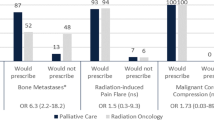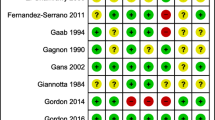Abstract
Purpose
Corticosteroids are commonly used in palliative care settings, but are associated with several side effects. Although adverse events (AEs) are highly distressing for patients, few data are available from prospective studies to look at incidence or predictors of such harms. The aim of this study is to identify AE reporting among studies of patients with advanced cancer receiving corticosteroids for any reason.
Methods
A systematic review was conducted using the following data sources: PubMed, Medline, SCOPUS, Cochrane reviews, and CINAHL. Randomized controlled trials (RCTs) with patients with advanced cancer assessing the effect of corticosteroids were included. Consecutive cohort observational studies of corticosteroid toxicities in cancer patients were also included.
Results
Twenty-seven RCTs and 12 consecutive cohort observational studies were identified. The most frequently reported primary outcome of RCTs was nausea and vomiting (8/27). Dexamethasone was prescribed in almost half of RCTs (13/27). In consecutive cohort studies, the primary outcomes were a wide variety of symptoms. Dexamethasone was also the most common glucocorticoid used (7/12). In terms of quality of AE reporting, two RCTs and one consecutive cohort study used a validated AE assessment tool in their studies.
Conclusions
Side effects of corticosteroids in advanced cancer patients were poorly reported with few data using validated tools. Researchers should be aware of the guideline of AE reporting to provide the best evidence of risk-benefit balance. Developing specific consensus guidelines about AE reporting in studies of glucocorticoids in studies of people with advanced cancer would be useful.


Similar content being viewed by others
References
Lundström SH, Fürst CJ (2006) The use of corticosteroids in Swedish palliative care. Acta Oncol 45:430–437
Riechelmann RP, Krzyzanowska MK, O'Carroll A, Zimmermann C (2007) Symptom and medication profiles among cancer patients attending a palliative care clinic. Support Care Cancer 15:1407–1412
Nauck F, Ostgathe C, Klaschik E, Bausewein C, Fuchs M, Lindena G, Neuwöhner K, Schulenberg D, Radbruch L, Working Group on the Core Documentation for Palliative Care Units in Germany (2004) Working group on the core documentation for palliative care units in Germany. Drugs in palliative care: results from a representative survey in Germany. Palliat Med 18:100–107
Adcock IM, Ito K (2005) Corticosteroids. In: Nijkamp FP, Parnham MJ (eds) Principles of Immunopharmacology. Birkhäuser, Basel, pp 483–497
Vandenbroucke JP (2006) What is the best evidence for determining harms of medical treatment? CMAJ 174:645–646
Ioannidis JP, Lau J (2002) Improving safety reporting from randomized trials. Drug Saf 25:77–84
Carmichael K, Nolan SJ, Weston J, Tudur Smith C, Marson AG (2015) Assessment of the quality of harms reporting in non-randomised studies and randomised controlled studies of topiramate for the treatment of epilepsy using CONSORT criteria. Epilepsy Res 114:106–113
Hatano Y, Currow DC, Matsuoka H (2015) Psychotropic side effect of corticosteroids in advanced cancer: a systematic review and meta-analysis. PROSPERO 2015:CRD42015025813 Available from http://www.crd.york.ac.uk/PROSPERO/display_record.asp?ID=CRD42015025813 [accessed 13 Dec 2017]
Ioannidis JP, Evans SJ, Gøtzsche PC et al (2004) CONSORT group. (2004) better reporting of harms in randomized trials: an extension of the CONSORT statement. Ann Intern Med 141:781–788
Cochrane handbook for systematic reviews of interventions. Available from: http://training.cochrane.org/handbook
National Institute of Health, National Cancer Institute. Common Terminology Criteria for Adverse Events (CTCAE) Available from https://ctep.cancer.gov/protocolDevelopment/electronic_applications/ctc.htm (accessed 13 Dec 2017)
Hoffer D, Smith SM, Parlow J, Allard R, Gilron I (2016) Adverse event assessment and reporting in trials of newer treatments for post-operative pain. Acta Anaesthesiol Scand 60:842–851
Meghelli L, Narducci F, Mariette C, Piessen G, Vanseymortier M, Leblanc E, Collinet P, Duhamel A, Penel N (2016) Reporting adverse events in cancer surgery randomized trials: a systematic review of published trials in oesophago-gastric and gynecological cancer patients. Crit Rev Oncol Hematol 104:108–114
Patient-Reported Outcomes version of the Common Terminology Criteria for Adverse Events (PRO-CTCAE™) Available from: https://healthcaredelivery.cancer.gov/pro-ctcae/ (accessed 13 Dec 2017)
Yennurajalingam S, Frisbee-Hume S, Palmer JL, Delgado-Guay MO, Bull J, Phan AT, Tannir NM, Litton JK, Reddy A, Hui D, Dalal S, Massie L, Reddy SK, Bruera E (2013) Reduction of cancer-related fatigue with dexamethasone: a double-blind, randomized, placebo-controlled trial in patients with advanced cancer. J Clin Oncol 31:3076–3082
Paulsen O, Klepstad P, Rosland JH, Aass N, Albert E, Fayers P, Kaasa S (2014) Efficacy of methylprednisolone on pain, fatigue, and appetite loss in patients with advanced cancer using opioids: a randomized, placebo-controlled, double-blind trial. J Clin Oncol 32:3221–3228
Matsuo N, Morita T, Iwase S (2011) Efficacy and undesirable effects of corticosteroid therapy experienced by palliative care specialists in Japan: a nationwide survey. J Palliat Med 14:840–845
Chou R, Helfand M (2005) Challenges in systematic reviews that assess treatment harms. Ann Intern Med 142:1090–1099
Hardy JR, Rees E, Ling J, Burman R, Feuer D, Broadley K, Stone P (2001) A prospective survey of the use of dexamethasone on a palliative care unit. Palliat Med 15:3–8
Lawlor PG, Gagnon B, Mancini IL, Pereira JL, Hanson J, Suarez-Almazor ME, Bruera ED (2000) Occurrence, causes, and outcome of delirium in patients with advanced cancer: a prospective study. Arch Intern Med 160:786–794
Acknowledgements
We thank Mikaela Lawrence, a librarian who assisted us in the search filtering.
Author information
Authors and Affiliations
Corresponding author
Ethics declarations
Conflict of interest
The authors declare that they have no conflicts of interest.
Rights and permissions
About this article
Cite this article
Hatano, Y., Matsuoka, H., Lam, L. et al. Side effects of corticosteroids in patients with advanced cancer: a systematic review. Support Care Cancer 26, 3979–3983 (2018). https://doi.org/10.1007/s00520-018-4339-2
Received:
Accepted:
Published:
Issue Date:
DOI: https://doi.org/10.1007/s00520-018-4339-2




